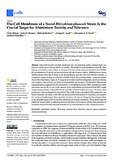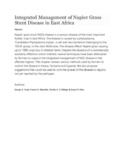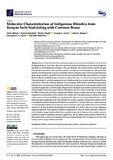Browsing University Journals/ Articles by Author "Asudi, George O."
Now showing items 1-4 of 4
-
The Cell Membrane of a Novel Rhizobium phaseoli Strain Is the Crucial Target for Aluminium Toxicity and Tolerance
Wekesa, Clabe; Muoma, John O.; Reichelt, Michael; Asudi, George O.; Furch, Alexandra C. U.; Oelmüller, Ralf (CELL, 2022-03-03)Soils with low pH and high aluminium (Al) contamination restrict common bean production, mainly due to adverse effects on rhizobia. We isolated a novel rhizobium strain, B3, from Kenyan soil which is more tolerant to Al ... -
Integrated Management of Napier Grass Stunt Disease in East Africa
Asudi, George O.; Muyekho, Francis N.; Midega, Charles A. O.; Khan, Zeyaur R. (Sustainability in Plant and Crop Protection, 2020-02-06)Napier grass stunt (NGS) disease is a serious disease of the most important fodder crop in East Africa. The disease is caused by a phytoplasma, ‘Candidatus Phytoplasma oryzae’, a cell wall-less bacterium belonging to the ... -
Molecular Characterization of Indigenous Rhizobia from Kenyan Soils Nodulating with Common Beans
Wekesa, Clabe; Kiprotic, Kelvin; Okoth, Patrick; Asudi, George O.; Muoma, John O.; Furch, Alexandra C. U.; Oelmüller, Ralf (International Journal of Molecular Sciences, 2023-05-30): Kenya is the seventh most prominent producer of common beans globally and the second leading producer in East Africa. However, the annual national productivity is low due to insufficient quantities of vital nutrients ... -
Rhizobia Contribute to Salinity Tolerance in Common Beans (Phaseolus vulgaris L.)
Wekesa, Clabe; Asudi, George O.; Okoth, Patrick; Reichelt, Michael; Muoma, John O.; Furch, Alexandra C. U.; Oelmüller, Ralf (Cell, 2022-11-16)Rhizobia are soil bacteria that induce nodule formation on leguminous plants. In the nodules, they reduce dinitrogen to ammonium that can be utilized by plants. Besides nitrogen fixation, rhizobia have other symbiotic ...




